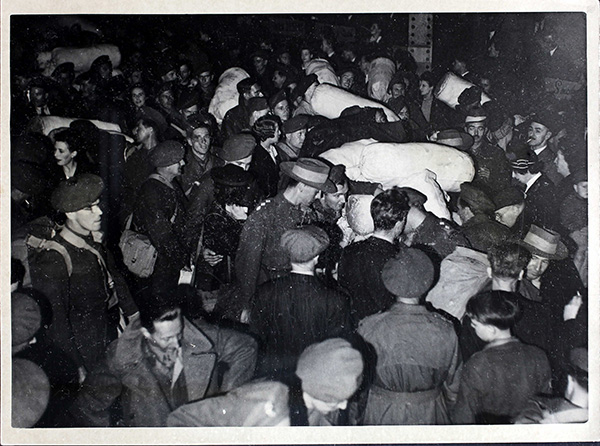We’re following the story of Temporary Captain (War Substantive Lieutenant) Ernest Gordon, who was captured at Singapore and came within inches of death, surviving only thanks to the care of two fellow prisoners.
Gordon was born in Scotland on 31st May 1916. He joined the 2nd Battalion of the Argyll and Sutherland Highlanders before the Second World War as a Territorial Army officer. 2nd Battalion was deployed to the Far East on the outbreak of war in order to protect British colonial possessions like India, Burma and the very important naval base at Singapore from Japanese attack.
Unfortunately for the British, Dominion and Colonial troops around Singapore, the numerically inferior Imperial Japanese Army harried and outwitted them, forcing the British surrender on 15th February 1942. Ernest Gordon was amongst the 60,000 soldiers captured.
Demonstrating their British pluck, Gordon and a number of other prisoners escaped their Japanese captors and successfully made their way to Java, Indonesia. They then took a native fishing boat from Padang and attempted to sail across the Indian Ocean for Sri Lanka. Once again fate got the better of them as Imperial Japanese Navy warships picked them up and ferried them back to Singapore.
Along with hundreds of other prisoners, Gordon was force marched from Singapore to the Jungles of Siam, where they would all participate in the construction of the Death Railway and the Bridge on the River Kwai.
It was not just the brutal treatment inflicted by Japanese soldiers that the POWs were forced to contend with. Gordon suffered the effects of numerous illnesses and disease including: malnutrition, malaria, diphtheria, typhoid, beriberi, jungle ulcers, and an operation to remove a kidney, performed without pain relief. Gordon was so close to death that the Japanese soldiers placed him in what was called the “Death Ward”, a barracks specifically set aside for prisoners who had no hope of survival.
Here however, he found salvation in the form of two fellow prisoners, who cared for him and treated his wounds and illnesses to the best of their abilities. “Dusty Miller”, a Methodist, and “Dinty” Moore, a Roman Catholic, spent 24 hours a day with him. Gordon, an agnostic, was impressed and inspired by the selfless faith of these two soldiers which gave him a renewed hope and a sense of purpose. His miraculous recovery would go on to inspire the other men of the camp.
As Gordon recovered, he set up a university for the men in order to continue driving them and add purpose and direction to their lives in turn. Initially it was carried out in secret, however the Japanese guards eventually allowed it.
This would not be the end of Gordon’s trauma, however. He was witness to one particular incident, according to Real Heroes, wherein a work party apparently lost a shovel. A Japanese guard threatened the entire party with execution unless the culprit came forward. One soldier stepped forward and stood to attention. He was beaten to death by the guard, the folly being that it was later discovered that the guard had miscounted the inventory, and thus there had never been a missing shovel.
Gordon ultimately survived the war and his internment. It is hard to believe a man could suffer all the above and come out alive, but what happened next must have deeply affected him. On liberation he sought news of his friends who had cared for him in the Death Ward. He found that, two weeks before the war’s end, “Dusty Miller” had been crucified by a Japanese soldier who was frustrated with Dusty’s sense of calm in the face of hardship. “Dinty” had sadly been killed when the Allies sunk his, unmarked, Prisoner Transport Ship.
After the war, Gordon moved to America where he became the Dean of the chapel at Princeton University; quite the turnaround for someone who used to describe themselves as agnostic. “Dusty” and “Dinty” clearly played a huge role in influencing the rest of Gordon’s life, as he wrote his autobiography eventually titled “To End All Wars”. His biography was adapted into the screenplay for the movie of the same name, released in 2001, starring Robert Carlyle and Keiffer Sutherland.
Ernest Gordon died on 16th January 2002, survived by his son Alastair and daughter Gillian Crozier.

